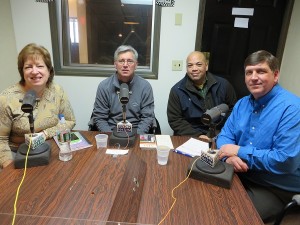
Kathy Ohman of FORWARD, Bill Cannata of Autism & Law Enforcement Education Coalition, Troy Smith of Cape Abilities and Glenn Loomis of Cape Abilities talk about safety training for first responders, as well as family and friends of people with autism and other disabilities..
DENNIS – More than 10 years ago, a group of parents of children with autism came up with the idea of special training for public safety officials and others who interact with people with special needs.
This week, the Dennis Police Department is offering safety training for friends, family members and others who interact with people on the autism spectrum or with another developmental disability.
The free program, Safety Training for Families of Children with Special Needs, takes place on Tuesday, February 24, from 6 to 8 p.m. at Dennis Police Headquarters at 90 Bob Crowell Road in South Dennis.
The training will address how parents and caregivers can better prepare their loved one for an emergency that may involve intervention from first responders.
Kathy Ohman of Dennis, one of the founders of Friends or Relatives with Autism and Related Disabilities (FORWARD), has two autistic sons. She said a fear of hers is that autistic children or adults will be misunderstood in a crisis.
“People with autism can look like they are on drugs or have substance abuse issues. They can look like they are having some kind of nervous breakdown, I suppose. And when they are agitated they can be very upset and it can be pretty scary so it’s important for first responders to know what they’re dealing with,” she said.
Through FORWARD, Ohman is working with others to develop a housing complex in Dennis for people with autism. She said it occurred to her that there should be training for public safety workers in Dennis who might come into contact with people with autism at the housing development. The first training session took place last fall at the Dennis Police Department after she learned of a training program off-Cape.
“That’s how our local trainings in Dennis came about. I started thinking that if we’re going to move into a neighborhood in Dennis, shame on us if we don’t provide training for fire and police and let people we’re there and how we can work together,” she said.
She worked on that training with Bill Cannata, a captain with the Westwood Fire Department, who is program director of The Arc of South Norfolk Family Autism Center’s ALEC Program, which stands for Autism & Law Enforcement Education Coalition. He started a safety training program for first responders more than 10 years ago.
The idea to have such a program came up in 2003, Cannata said, when a group of parents in the Boston area expressed concern about their children having contact with first response officials that would not understand about autism and would not know how to react in a crisis.
Cannata was one of those parents. They formed the group ALEC and launched their first program in 2004 to train first responders in the South Norfolk County area. The group was sponsored by the ARC of South Norfolk and at the time, district attorney—now congressman—William Keating.
Their initial goal was to train 300 public safety officials in just that county, but when state social services officials heard about the program, they provided funding that has allowed the group to train more than 32,000 people all across the country.
Over the years of the program, members have trained thousands of firefighters and EMTs in the United States in autism awareness and have given first responders the tools necessary to mitigate incidents that they may come across.
Cannata said autism affects 1 in 64 people in the United States. The message he gives to first responders is, “It is not a matter of if you will come in contact with someone from the autism community, it is most definitely when you do.”
Cannata said the training begins with the basics.
“The first piece, especially with law enforcement, is recognition. If they are able to recognize it, even on approach, that’s just going to change their whole approach, which is very important,” Cannata said.
Cannata said the training also focuses on different ways to communicate.
“We teach them how to actually work with them, how to communicate. Communication is a big issue with a lot of our people, especially with autism. Fifty percent are non-verbal. That’s a bridge you have to gap right away,” he said.























